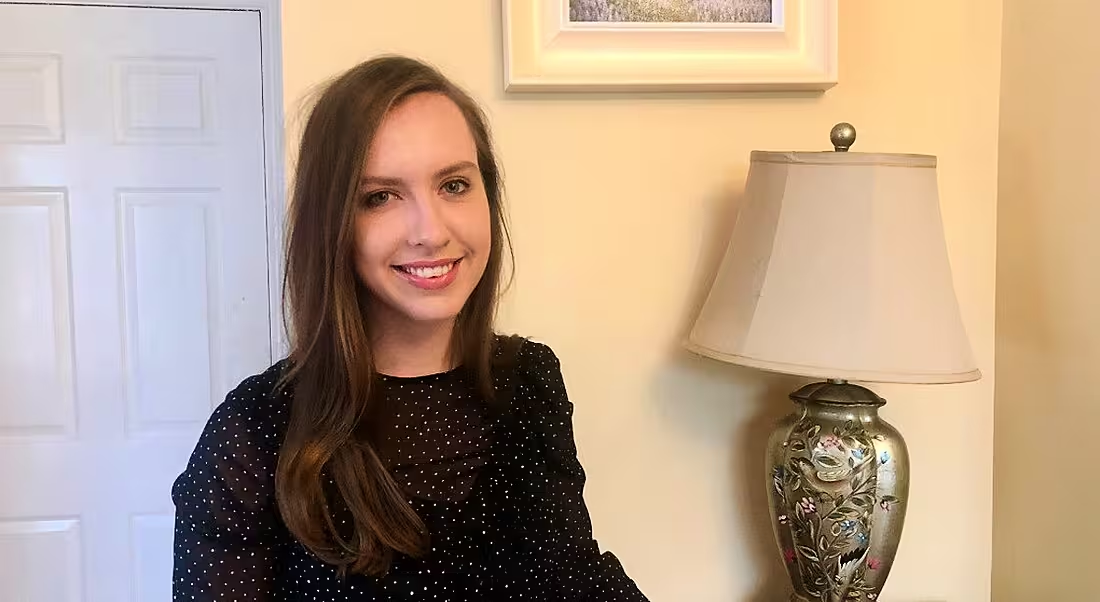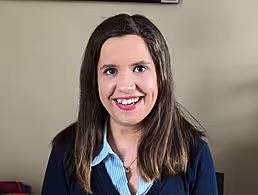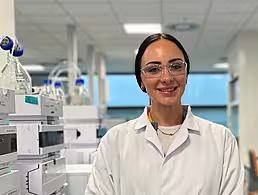Laura Sinnott of Aon’s Centre for Innovation and Analytics discusses what it’s like working as a data scientist in the insurance sector.
When Laura Sinnott’s career as a data scientist first began, she quickly learned that hands-on experience was the key to finding her feet. Here, she talks about her journey in the field since then and what we can do about the gender gap that persists in maths-based sectors.
‘I think creativity goes hand-in-hand with innovation, which is a critical trait of a successful data scientist’
– LAURA SINNOTT
What drew you to this career area?
Having always had a keen interest in maths at school, I studied mathematical science in UCD and specialised in a degree in statistics. It was during machine learning, data mining and programming modules in university that I realised I got great satisfaction from solving problems using a combination of maths, statistics and algorithms with computer science.
In 2016, having completed my third year in college, I heard about the summer internship in the Aon Centre of Innovation and Analytics (ACIA). I was lucky to be accepted and designated to the data science team for this eight-week programme. Following graduation, I returned to Aon as a permanent member of the data science team.
What’s the best thing about working as a data scientist?
Data science is a field where advancements are accelerating at a rapid rate. It’s important to be adaptable to change and to the new discoveries in research, but I think this is what makes it exciting. Big data is disrupting every industry in some form.
Technology and research have had to keep up with these huge advancements and, in turn, I as a data scientist need to keep informed of these new tools and processes. From scalable machine learning pipelines to the latest developments in natural language processing, the range of tools and algorithms is growing every day. There is always a new cool thing to learn about and you never get bored!
What’s the most exciting development you’ve witnessed in your sector since you started working in it?
I work in the insurance industry, where the foundations of pricing risk have always been based on data. We are beginning to see the traditional actuarial techniques in risk modelling being challenged by machine learning approaches. The insurtech industry is evolving with these new advancements and it will be interesting to see where they take us in the next few years.
Outside of my sector, the use of data science during the Covid-19 pandemic has been imperative to the prediction and prevention of the spread of the disease. At the beginning, the models told us how the disease would spread if we continued to live as normal. As behavioural patterns in society changed with imposed lockdowns, it was interesting to see how quickly the predictions would react to the new data points of this new reality.
What aspect of your job have you struggled to get to grips with?
A data scientist’s job is very much centred around research and development. The team could spend a few weeks trying to deliver a proof of concept, only to discover that the data we were using just didn’t provide the relevant insights.
It can be frustrating to abandon a project that you have put so much time and effort into, if it doesn’t work out. For me, it is important to always be appreciative of the lessons and skills I have learned along the way and to know that no project is ever a waste of time.
What’s been the hardest thing you’ve had to face in your career and how did you overcome it?
Starting my first job as an entry-level data scientist was exciting but also intimidating. While university prepared me for theoretical practices in statistics and analytics, it couldn’t prepare me for the fast-paced insurance industry and the highly technical platform of tools used in the centre.
Looking back, I felt overwhelmed at first, but I soon found out that there is nothing quite like learning through hands-on experience. Having the opportunity to learn from industry experts while leveraging cutting-edge technology was invaluable in my development.
If you had the power to change anything within the STEM sector, what would that be?
It’s no secret that there is a gender gap in many STEM fields and in data science in particular. There are some excellent organisations and meetups established to support and encourage women and girls to pursue careers in data science and these were a great resource to me at the beginning of my career.
It’s great to see the benefit these groups are providing to help close that gap, however I think that the gender gap begins when girls are completing their CAO forms. While many of them excel in STEM at school, they tend to go down the traditional career paths of laboratory science and teaching. It would be great to see more girls embarking on mathematical-based careers.
Which of your personality traits makes you best suited to your job and this sector?
I have an inquisitive mind, enjoy new challenges and am an enthusiastic learner. I think these things are crucial in data science. My attention to detail and open mind have also helped me along the way.
Is there something in your personal life that has helped you in your job?
I have very encouraging family and friends who I can always go to for support and guidance. It’s very important for me to strike a good work-life balance and to enjoy time off with friends and family.
During lockdown, I have been working from home which means no commuting and a lot of extra time on my hands. I rediscovered my passion for art and drawing, which is a great way to unwind and clear the mind. I think creativity goes hand-in-hand with innovation, which is a critical trait of a successful data scientist.
How do you make connections with others in the STEM community?
Meetups and conferences are great ways to network with STEM peers. I am a member of the Analytics Institute of Ireland, which hosts excellent seminars and conferences. Last year I attended the National Analytics Summit which hosted speakers, not only from Aon but from all corners of the analytics world such as NASA, CERN and Formula 1, to name a few. It was a great opportunity to learn from and network with data scientists from all different sectors.
Has mentorship or coaching been important in your career?
Joining a huge company as an intern with no experience was challenging and mentorship from the senior members of my team was a crucial part of my development. They instilled their enthusiasm in me by sharing their experience and knowledge and answering all my questions.
Even now, mentorship is an important aspect of my job and not just on the data science team. In the ACIA, we get to work on multidisciplinary agile teams. You could be working closely and liaising with application developers and designers on front-end and visualisation, right to solution architects and data engineers on data flow. It’s important to share knowledge with one another and to understand the role each team member plays.
What advice would you give to someone thinking about a career in data science?
Data science is a very exciting industry to be working in right now. The skills you learn can be transferred across so many industry domains, from insurance to sport and everything else in between. It is an up-and-coming industry with an infinite range of applications.
So, if you have a curious mind and get a kick out of problem solving, this may be the career for you. The advice I would give to someone thinking about a career in data science is to be open-minded, adaptable to change and ask lots of questions. Curiosity will get you far.




